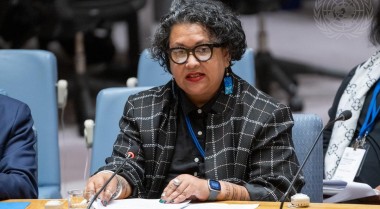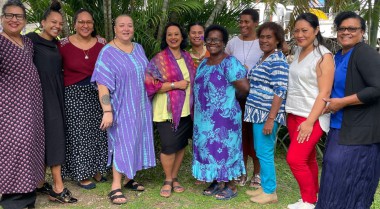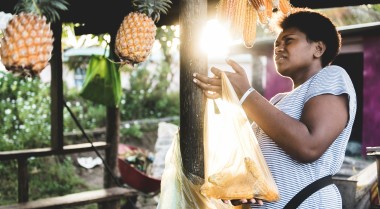
Civil Society Statement: Peacebuilding Commission Expert-Level Meeting
On 19 March 2024, Sharon Bhagwan Rolls, Programme Manager of the Pacific Women Mediators Network and GPPAC International Steering Group Gender Liaison, delivered the following statement on behalf of civil society to the Peacebuilding Commission Expert-Level Meeting.
Thank You, Chair! Dear Colleagues,
My name is Sharon Bhagwan Roll. I am the Programme Coordinator of the Pacific Women Mediators Network and Gender Liaison of the Global Partnership for Prevention of Armed Conflict (GPPAC)'s International Steering Group.
I would like to thank the Permanent Mission of Brazil for organising this important discussion.
By itself, such a convening is a good practice. We hope such a modality will be taken forward during the upcoming convenings, including the Youth Forum, High-Level Political Forum, and the Summit of the Future, as well as by incoming chairs.
Please allow me to provide the following four points for your consideration:
First, more regular exchanges with diverse local peacebuilders can provide the Commission with concrete suggestions for shaping impactful global policies.:
One example illustrating this necessity is the Pacific's call to take the impacts of climate change on peace and security seriously and early on. GPPAC's review of the last five years of the functioning of the Commission found that, in 15 specific contexts, the interlinkages between climate and peace and security were discussed. Such widespread relevance of this topic confirms that global policies cannot be blind to the impacts of climate change on peace and security.
The governments in the Pacific have spearheaded the development of a more comprehensive definition of security in the Pacific. Our Blue Pacific Strategy to 2050 and the Boe Declaration on Regional Security embrace an expanded concept of security that includes human security, economic security, humanitarian assistance, and environmental security.
Grounded in local communities, the work of GPPAC Pacific operationalises inclusive human security approaches through conflict and gender-sensitive programming across the Triple Nexus.
This enables us to collectively meet the human security priorities of diverse people who experience intersecting crises: disasters, COVID-19 and climate change, armed conflicts, inter-communal violence, and political crises.
Through this comprehensive definition and coherent action, we are enhancing our effectiveness in conflict prevention.
We hope that the Peacebuilding Commission can accelerate its effort to bring together various partners to discuss the impacts of climate change through a conflict-sensitive lens.
Furthermore, we encourage the Commission to provide appropriate advice to other intergovernmental bodies that are mandated to provide normative and operational guidance to the UN system for addressing peace and security risks and opportunities posed by climate change.
Second, as a critical element of the UN Peacebuilding Architecture, the Peacebuilding Commission plays a critical role in advancing conflict sensitivity across the work of the UN System and beyond by supporting systematic engagements with local peacebuilders and women mediator networks, as well as with regional and international organisations, financial institutions, and the private sector, to discuss and integrate gender- and conflict-sensitivity across the Triple Nexus. This could be an opportunity for us to share some of the feminist funding modalities we develop in the Pacific.
In the Pacific, with the launch of the Pacific Women Mediators Network in June 2023 and the Revitalised Pacific Forum Leaders Gender Equality Declaration, women peacebuilders will have an opportunity to bridge the traditional and non-traditional security divide to progress inclusive climate action, development, peace and security, and human rights.
Third, as the first UN intergovernmental organ to adopt a Gender Strategy, the mission of the Commission closely aligns with the mission of regional mediators networks that are present in 8 regions of the world (S/2023/725, fn. 14) that have a unique ability to streamline women peacebuilders' engagement across the Triple Nexus and in a conflict-sensitive manner.
The Commission should devise concrete ways to engage regularly with regional women mediators networks to ensure the systematic integration of gender dimensions into all thematic, country, and regional engagements of the Commission and to promote the recommendations of women peacebuilders in the Commission's advisory role to other intergovernmental bodies and in its engagement with IFIs and regional organisations.
Finally, as I mentioned in the beginning, we hope that this meeting will create a foundation for more regular engagement between the Commission and women peacebuilders and peacebuilding networks.
One effective avenue could be establishing an inclusive and transparent process for the nomination of civil society briefers from the frontlines of peacebuilding across the Triple Nexus.
I hope the insights shared today will be meaningfully reflected in the Commission's work moving forward.
I Thank You!


